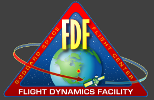
The FDF provides navigation support for all mission phases and flight regimes, including launch and powered-flight, post-separation, orbit transfer, on-orbit, orbit adjust and momentum management, and re-entry. We routinely evaluate tracking system performance and certify new tracking capability; provide pointing information to multiple network elements for all flight phases; and, provide navigation support for missions in ballistic, low-Earth, geosynchronous, lunar, Lagrange, and heliocentric trajectories.
Our facility provides performance evaluation, calibration, and validation of SN and NEN tracking systems. The FDF also provides tracking data analysis for Goddard projects supported by other networks, e.g., the DSN, DoD C-band radars, and ESA.
The FDF ingests, processes, and stores numerous data types, including: S-band UTDF; low-speed C-band; DSN S-band, X-band, Delta DORR; SN Ka-band for both SSA and MA services; GPS; NORAD B3; and, Differenced One-Way Doppler with simultaneous TDRS support. We have the expertise to incorporate and process new tracking data types depending upon the mission requirement.
We employ state-of-the-art environmental models and space weather predictions to improve the fidelity of our analyses, predictions, and definitive orbit solutions, and investigate emerging dynamical models that have the potential to further improve the results of our work. These include different techniques for evaluating the effects of the Earth’s atmosphere, gravity models, and solar activity.
The FDF performs the following satellite navigation services:
- Navigation Analysis
- Definitive Orbit Determination and State Propagation
- Acquisition Data Generation and Transmission
- Planning Product Generation
- Maneuver Support
- Radiometric Tracking Data Evaluation
- Local Oscillator Frequency Evaluation
- RF Compatibility Test Support
- Certification of Network Tracking Assets
- Satellite Re-entry Predictions

